Rodenstock Photo Optics
Rodenstock Photo Optics
Rodenstock Photo Optics
You also want an ePaper? Increase the reach of your titles
YUMPU automatically turns print PDFs into web optimized ePapers that Google loves.
<strong>Rodenstock</strong> <strong>Photo</strong> <strong>Optics</strong><br />
a brand of the LINOS <strong>Photo</strong>nics GmbH & Co. KG<br />
Special filters<br />
for digital photography<br />
HR Digital Circular Polarizer<br />
HR Digital UV Blocking Filter<br />
UV/IR Blocking Filter<br />
Filters for analog and<br />
for digital photography<br />
Linear and Circular Polarizers<br />
UV Blocking Filter<br />
Neutral Density Filters<br />
Skylight Filter<br />
Filters for b&w photos<br />
Quality Filters<br />
If it is too bright for taking photos or if the light is not neutral<br />
white, if there is too much UV radiation or if unwanted reflections<br />
occur on glossy surfaces? Or if the black and white mode<br />
of the digital camera or black and white film does not convert<br />
the object colors into the gray values the photographer really<br />
wants? Then <strong>Rodenstock</strong> quality filters can help.<br />
Filters should never impair the lens quality. No one is willing to<br />
obtain the desired effects at the cost of blur, flare or ghost images.<br />
<strong>Rodenstock</strong> hard coated quality filters made from highgrade<br />
optical glass guarantee that sharpness, contrast and color<br />
faithfulness are maintained even with the best lenses.<br />
■ Filters can adapt the light to the film so that it “sees” like<br />
the eye or just as it is necessary to realize the effects desired<br />
by the photographer. The human eye in cojunction with the<br />
brain as a “feedback control circuit” can adapt easily to the<br />
varying conditions of brightness, contrast and color hue and<br />
“overlook” effects which create falsification for the lens and<br />
the film and which can lead to overexposure or color shift.<br />
Filters can frequently eliminate such errors, or at least reduce<br />
them to a negligible level.<br />
■ But filters can do more than just remedy defects. Sometimes<br />
the photographer will deliberately use a filter to achieve a<br />
better effect by deviating from the natural image. In these<br />
cases, too, the photographer wants to enhance the result so<br />
that once again only the best filters are good enough.<br />
It is an erroneous view that filters would be obsolete for digital<br />
photography because of the “white balance” function of the<br />
cameras and the manifold manipulations that may be done<br />
later with imaging software on the computer. The truth is that<br />
in many cases (e.g. UV/IR blocking filters, ND filters and polarizers)<br />
filters cannot be replaced by later manipulation via software,<br />
and that in other cases (control of conversion of the object<br />
colors into gray values) filters are much more comfortabe<br />
and time saving in usage and provide much better results. On<br />
the other hand, imaging software allows different manipulations<br />
and corrections that cannot be executed with filters.<br />
The <strong>Rodenstock</strong> HR Digital filters are multi-coated with seven<br />
layers plus an additional dirt and water repelling cover layer.<br />
For preventing from getting stuck, they have a better sliding<br />
brass filter frame with also has less thermal expansion.<br />
<strong>Rodenstock</strong> quality filters are produced to the same<br />
very high standards as premium photo lenses<br />
– 63 –<br />
Data sheets<br />
Filter order numbers for<br />
thread sizes up to E 58<br />
Filter oder numbers for<br />
thread sizes from E 60
<strong>Rodenstock</strong> <strong>Photo</strong> <strong>Optics</strong><br />
a brand of the LINOS <strong>Photo</strong>nics GmbH & Co. KG<br />
Back to filter overview<br />
Special filters<br />
for digital photography<br />
HR Digital Circul. Polarizer<br />
HR Digital UV Blocking Filter<br />
UV/IR Blocking Filter<br />
Filters for analog and<br />
for digital photography<br />
Linear and Circular Polarizers<br />
UV Blocking Filter<br />
Neutral Density Filters<br />
Skylight Filter<br />
Filters for b&w photos<br />
HR Digital Filters for digital photography<br />
Circular Polarizing Filter<br />
In a rotatable mount, this filter for analog as well as for digital<br />
photography contains a micro-thin polarizing film sandwiched<br />
between two protective glass plates. This film transmits light<br />
only in one polarization plane. Non-polarized normal light is<br />
reduced about by half without any further visible effect,<br />
roughly like by an ND filter 2×. In contrast, polarized light is either<br />
transmitted without hindrance, more or less reduced or<br />
even totally rejected by the polarizer, depending on the setting.<br />
Light is polarized when slanted incident light is reflected from<br />
an electrically non-conducting surface like glass, varnish and<br />
plastics. Water has a very low conductivity (in comparison with<br />
metal) so that its reflections are polarized. Even reflections on<br />
aluminum are also polarized, because aluminum forms a nonconductive<br />
surface layer of aluminum oxide when it has been<br />
anodized for a better resistance and a layer of aluminum oxide<br />
and aluminum carbonate in air as an environmental process.<br />
By turning the polarizing filter in its rotatable mount in front<br />
of the lens, it is possible to effectively control the intensity of<br />
reflections and the saturation of colors (e.g. in landscapes):<br />
1. If the transmission direction of the polarizing filter runs parallel<br />
to the polarization plane, the reflection appears twice as<br />
bright, because the polarized reflected light is transmitted fully<br />
while the remaining light is reduced by about 50%.<br />
2. If the direction of vibration of the polarized light and the<br />
transmission direction of the polarizing filter are crossed, the<br />
reflection is reduced or even suppressed. At an incident angle<br />
of about 55° to 60° from the normal, this effect is strongest<br />
and the suppression practically complete. This angle depends<br />
on the refractive index of the surface according to Brewster's<br />
law. With smaller or larger angles the polarization decreases.<br />
Circular polarizers have an additional film behind the polarizing<br />
film to avoid interference with beam splitters in the light<br />
path of SLR cameras (as they ar used for TTL meters and AF<br />
cells). This prevents from overexposure and AF malfunction.<br />
Filter type Time or aperture correction<br />
HR Digital Circular Polarizer 2× - 3× 1 - 1.5 f-stops<br />
– 64 –<br />
Data sheets<br />
Filter order numbers for<br />
thread sizes up to E 58<br />
Filter oder numbers for<br />
thread sizes from E 60
<strong>Rodenstock</strong> <strong>Photo</strong> <strong>Optics</strong><br />
a brand of the LINOS <strong>Photo</strong>nics GmbH & Co. KG<br />
Back to filter overview<br />
Special filters<br />
for digital photography<br />
HR Digital Circular Polarizer<br />
HR Dig. UV Blocking Filter<br />
UV/IR Blocking Filter<br />
Filters for analog and<br />
for digital photography<br />
Linear and Circular Polarizers<br />
UV Blocking Filter<br />
Neutral Density Filters<br />
Skylight Filter<br />
Filters for b&w photos<br />
HR Digital Filters for digital photography<br />
UV Blocking Filter<br />
This glass filter has been design specificially for digital photography.<br />
It is practically neutral in color effect, transmits visible<br />
light without hindrance while cutting out ultra-violet (UV) radiation.<br />
Due to the short wavelength, UV is highly scattered<br />
and has a high intensity in hazy conditions as diffuse radiation.<br />
Because most sensors of digital cameras are also a little bit<br />
sensitive for ultra-violet (less than for infrared, but much more<br />
than your eye), they react with a blue-violet or even a red veil,<br />
giving the sky a brighter look, thus reducing the contrast of<br />
the clouds against the sky and making distance views pale.<br />
Whilst under normal conditions, UV absorption of the glass of<br />
multi-elements lenses is sufficient to prevent the violet cast<br />
and loss in contrast caused by the weak UV radiation, in the<br />
high mountain regions and at the sea, the intensity of the UV<br />
radiation may be so strong that UV blocking filters are needed.<br />
With a UV filter in front of the lens, especially warm colors like<br />
yellow, orange and red remain pure and distance views become<br />
clearer and crisper. Because of the very steep cut-off below<br />
420 nm for UV, the absorption within the visible wavelength<br />
range is almost imperceptible, color balance remains<br />
neutral and you do not need to extend the exposure time or<br />
to set a larger aperture. This is why the UV blocking filter can<br />
also be used as a good lens protection, e.g. against salt water<br />
splashes, wind-borne sand or even finger-prints.<br />
The filter glass of the HR Digital UV Blocking Filter is very thin<br />
(only 1.4 mm), and this allows a very slim frame that does not<br />
cause any vignetting even with wide-angle lenses.<br />
The seven-layer multi-coating ensures high transmission and<br />
suppression of reflections for brilliant photos free from ghost<br />
and flare. An additional extremely scratch-resistant as well as<br />
dirt and water-repellent protection layer keeps the glass surface<br />
clean over a longer period and makes cleaning easier.<br />
A brass filter frame prevents from quality degrading mechanical<br />
strain due to its very low thermal expansion coefficient.<br />
Filter type Time or aperture correction<br />
HR Digital UV Blocking Filter 1× 0 f-stops<br />
UV blocking filter: for pure colors, clear distance views<br />
and ideal for protecting the front element of the lens<br />
– 65 –<br />
Data sheets<br />
Filter order numbers for<br />
thread sizes up to E 58<br />
Filter oder numbers for<br />
thread sizes from E 60
<strong>Rodenstock</strong> <strong>Photo</strong> <strong>Optics</strong><br />
a brand of the LINOS <strong>Photo</strong>nics GmbH & Co. KG<br />
Back to filter overview<br />
Special filters<br />
for digital photography<br />
HR Digital Circular Polarizer<br />
HR Digital UV Blocking Filter<br />
UV/IR Blocking Filter<br />
Filters for analog and<br />
for digital photography<br />
Linear and Circular Polarizers<br />
UV Blocking Filter<br />
Neutral Density Filters<br />
Skylight Filter<br />
Filters for b&w photos<br />
Filters for digital photography<br />
UV/IR Blocking Filter<br />
This glass filter is practically neutral in color effect. It transmits<br />
visible light without hindrance like the previously desdribed UV<br />
blocking filter while cutting not only ultra-violet (UV) radiation<br />
but also infrared (IR) radiation.<br />
Due to the short wavelength, UV is highly scattered and has a<br />
high intensity in hazy conditions as diffuse radiation. Because<br />
most sensors of digital cameras are also a little bit sensitive for<br />
ultra-violet, they react with a blue-violet or even a red veil, giving<br />
the sky a brighter look, thus reducing the contrast of the<br />
clouds against the sky and making distance views pale.<br />
In contrast to analog photography on film, in digital photography<br />
also the long-wave infrared radiation from the other end<br />
of the visible spectrum can degrade the image quality. This is<br />
due to the UV and (much higher) IR sensibility of the CCD and<br />
CMOS sensors. Therefore, an IR cut filter is used as or in addition<br />
to the protection glass in front of the sensor plane. However,<br />
experiance has shown that often its blocking capability is<br />
not sufficient if the IR radiation intensity is high. Then this results<br />
in color shift, loss of contrast and blur (because normal<br />
lenses are not aberration-corrected for the IR range).<br />
Therefore, in critical situations the use of an additional highly<br />
effective UV/IR blocking filter in front of the camera lens is recommended.<br />
Its effect cannot be simulated by digital image<br />
processing. The <strong>Rodenstock</strong> UV/IR Blocking Filter provides a<br />
very high steepness of both flanks because it is an interference<br />
filter with multiple dielectric coatings. So it does not give rise<br />
to an irritating coloration except an almost invisible reduction<br />
of violet and very long-wave red, and therefore it can be used<br />
as a permanent lens protection glass, too.<br />
Filter type Time or aperture correction<br />
UV/IR Blocking Filter 1× 0 f-stops<br />
UV/IR blocking filter: a must for many digital cameras<br />
and a useful lens protection as well<br />
– 66 –<br />
Transmission [%]<br />
100<br />
90<br />
80<br />
70<br />
60<br />
50<br />
40<br />
30<br />
20<br />
UV radiation Visible light<br />
IR radiation<br />
10<br />
0<br />
Yellow<br />
Blue<br />
Green<br />
Red<br />
200 300 400 500 600 700 800 900 1000 1100<br />
Wavelength [nm]<br />
Data sheets<br />
Filter order numbers for<br />
thread sizes up to E 58<br />
Filter oder numbers for<br />
thread sizes from E 60
<strong>Rodenstock</strong> <strong>Photo</strong> <strong>Optics</strong><br />
a brand of the LINOS <strong>Photo</strong>nics GmbH & Co. KG<br />
Back to filter overview<br />
Special filters<br />
for digital photography<br />
HR Digital Circular Polarizer<br />
HR Digital UV Blocking Filter<br />
UV/IR Blocking Filter<br />
Filters for analog and<br />
for digital photography<br />
Linear / Circular Polarizers<br />
UV Blocking Filter<br />
Neutral Density Filters<br />
Skylight Filter<br />
Filters for b&w photos<br />
Filters for analog and digital photography<br />
Polarizing Filters (linear and circular)<br />
In a rotatable mount, these filters contain a micro-thin polarizing<br />
film sandwiched between two protective glass plates.<br />
This film transmits light only in one polarization plane. However,<br />
non-polarized normal light consists of light waves vibrating<br />
in all possible directions at right angles to the direction of<br />
transmission. Therefore, normal light is reduced about by half<br />
without further visible effects, roughly like by an ND filter 2×,<br />
because one component (parallel with the polarization plane)<br />
passes the filter, and the other componen (perpendicular to<br />
the polarization plane) is blocked. In contrast, polarized light is<br />
either transmitted without hindrance, more or less reduced or<br />
even totally rejected by the polarizer, depending on the orientation<br />
angle between the polarizer's polarization plane and the<br />
vibration direction of the incident light.<br />
Light is polarized when slanted incident light is reflected from<br />
electrically non-conducting surfaces like glass, varnish or plastics.<br />
However, water also has a very low conductivity (in comparison<br />
with metal) so that water reflections are polarized. All<br />
these reflections can be enhanced or reduced or almost eliminated<br />
with a polarizer. It is most effective if the angle of incidence<br />
on the reflecting surface or the angle between the line<br />
of vision of the camera towards this surface (e.g. a shop window<br />
or a glossy laquered wall) and its normal is about 55°.<br />
Linear polarizers can be used with almost all non-SLR cameras<br />
(please see the manual). However, cameras with a beamsplitter<br />
in the light path (for AF control or TTL exposure measuring)<br />
are not compatible with linear polarizers as the polarizing effect<br />
of the beamsplitter interferes with that of the polarizer<br />
and this results in AF failure and/or overexposure respectively.<br />
Circular polarizers avoid this problem. They have an additional<br />
optically effective film (a quarter-wave plate) behind the polarizing<br />
film in order to convert the linear polarization into circular<br />
polarization which does not interfere with the AF and TTL<br />
metering beamsplitter. This is the reason why circular polarizers<br />
are the recommended polarizers for all SLR cameras.<br />
Filter type Time or aperture correction<br />
Linear Polarizer 2× - 3× 1 - 1.5 f-stops<br />
Circular Polarizer 2× - 3× 1 - 1.5 f-stops<br />
Polarizing filters: enhance or reduce or even eliminate<br />
reflections on electrically non-conducting surfaces,<br />
povide higher color saturation and enhance contrast<br />
– 67 –<br />
Data sheets<br />
Filter order numbers for<br />
thread sizes up to E 58<br />
Filter oder numbers for<br />
thread sizes from E 60
<strong>Rodenstock</strong> <strong>Photo</strong> <strong>Optics</strong><br />
a brand of the LINOS <strong>Photo</strong>nics GmbH & Co. KG<br />
Back to filter overview<br />
Special filters<br />
for digital photography<br />
HR Digital Circular Polarizer<br />
HR Digital UV Blocking Filter<br />
UV/IR Blocking Filter<br />
Filters for analog and<br />
for digital photography<br />
Linear and Circular Polarizers<br />
UV Blocking Filter<br />
Neutral Density Filters<br />
Skylight Filter<br />
Filters for b&w photos<br />
Filters for analog and digital photography<br />
UV Blocking Filter<br />
This glass filter is practically neutral in color effect. It transmits<br />
visible light without hindrance while cutting out ultra-violet<br />
(UV) radiation. UV is highly scattered because of its very short<br />
wavelength and can reach high intensity as diffuse radiation in<br />
hazy conditions. A color film reacts with a blue-violet veil, the<br />
sensor of a digital camera may either show a blue-violet or a<br />
red veil, while b&w film gives the sky a brighter look when the<br />
intensity of the UV radiation ist high, thus reduces the contrast<br />
of the clouds against the sky and makes distance views pale.<br />
Whilst under normal conditions, UV absorption of the glass of<br />
multi-elements lenses is sufficient to prevent the bluish cast<br />
and loss in contrast caused by the weak UV radiation, in the<br />
high mountain regions and at the sea, the intensity of the UV<br />
radiation may be so strong that UV blocking filters are needed.<br />
With a UV filter in front of the lens, especially warm colors like<br />
yellow, orange and red remain pure and distance views become<br />
clearer and crisper. Because of the almost imperceptible<br />
absorption within the visible wavelength range, the color rendition<br />
remains neutral, and you do not need to extend the exposure<br />
time or to set a larger aperture.<br />
Thanks to its totally neutral color rendition a UV blocking filter<br />
can also be used as a lens protection, e.g. against salt water<br />
splashes, wind-borne sand or even finger-prints.<br />
Filter type Time or aperture correction<br />
UV Blocking Filter 1× 0 f-stops<br />
UV blocking filter: for pure colors, clear distance views<br />
and ideal for protecting the front element of the lens<br />
– 68 –<br />
Data sheets<br />
Filter order numbers for<br />
thread sizes up to E 58<br />
Filter oder numbers for<br />
thread sizes from E 60
<strong>Rodenstock</strong> <strong>Photo</strong> <strong>Optics</strong><br />
a brand of the LINOS <strong>Photo</strong>nics GmbH & Co. KG<br />
Back to filter overview<br />
Special filters<br />
for digital photography<br />
HR Digital Circular Polarizer<br />
HR Digital UV Blocking Filter<br />
UV/IR Blocking Filter<br />
Filters for analog and<br />
for digital photography<br />
Linear and Circular Polarizers<br />
UV Blocking Filter<br />
Neutral Density Filters<br />
Skylight Filter<br />
Filters for b&w photos<br />
Filters for analog and digital photography<br />
Neutral Density (ND) Filters<br />
These dyed-in-the-mass glass filters for analog and digital photography<br />
have a neutral gray tint and reduce all visible colors<br />
equally, e.g. by two f-stops. This allows motion blur (smear<br />
effect with panning camera) to be achieved with a longer exposure<br />
time than would otherwise be permitted by the brightness<br />
of the illumination and the film speed or sensor sensitivity.<br />
Alternatively it allows the generation of less depth of field<br />
with a larger aperture. Another application is the light reduction<br />
in situations where the brightness of the motif is too high<br />
for a correct exposure with the shortest exposure time available<br />
at the given film speed or sensor sensitivity.<br />
WARNING: These ND filters must not be used as solar filters<br />
for observing the sun! For this purpose special solar filters are<br />
necessary with a much stronger absorption power not only<br />
within the visual range but also in the even more dangerous<br />
infrared range (which can burn the retina!).<br />
ND filters are available in different densities for an extension of<br />
exposure time by a factor of 2, 4 or 8 or for an opening of the<br />
diaphragm by 1, 2 or 3 f-stops alternatively.<br />
In a broader sense, center filters (gradation filters) are ND filters,<br />
too. These filters for wide-angle lenses of technical cameras<br />
with shift and tilt facilities are not dyed in the mass but<br />
are coated with an absorbing layer of high absorption (of 1.5<br />
to 2.5 f-stops) in the center and a decreasing absorption to<br />
the margin. They reduce the light drop caused by the extremely<br />
large image angle. Because of this special application, center<br />
filters are described in detail as accessories for the <strong>Rodenstock</strong><br />
lenses HR Digaron-S 23 mm and 28 mm as well as for all Grandagon-N<br />
and Apo-Grandagon lenses – please see there.<br />
Filter type Time or aperture correction<br />
ND Filter 2× 2× 1 f-stop<br />
ND Filter 4× 4× 2 f-stops<br />
ND Filter 8× 8× 3 f-stops<br />
Neutral density filters: free choice of shutter speed and<br />
f-stop for creative effects or depth of field manipulation<br />
– 69 –<br />
Data sheets<br />
Filter order numbers for<br />
thread sizes up to E 58<br />
Filter oder numbers for<br />
thread sizes from E 60
<strong>Rodenstock</strong> <strong>Photo</strong> <strong>Optics</strong><br />
a brand of the LINOS <strong>Photo</strong>nics GmbH & Co. KG<br />
Back to filter overview<br />
Special filters<br />
for digital photography<br />
HR Digital Circular Polarizer<br />
HR Digital UV Blocking Filter<br />
UV/IR Blocking Filter<br />
Filters for analog and<br />
for digital photography<br />
Linear and Circular Polarizers<br />
UV Blocking Filter<br />
Neutral Density Filters<br />
Skylight Filter<br />
Filters for b&w photos<br />
Filters for analog photography<br />
Skylight Filter<br />
A skylight filter for analog photography with reversal film has<br />
a very pale amber tint and acts like a UV filter to cut out ultraviolet<br />
radiation. In addition, it eliminates the bluish hue in the<br />
shadow due to the indirect light from the blue sky. This bluish<br />
color distortion is particularly unpleasant on skin. A skylight filter<br />
should only be used if the entire motif is in the shade. For<br />
the areas lit by direct sunlight will also be subject to the pink<br />
filter even though they do not have any bluish hue – they then<br />
turn pink. For this reason, a skylight filter should not be used<br />
for lens protection (use a neutral UV blocking filter instead).<br />
When taking black & white photos, a skylight filter does not<br />
have a visible effect and is unnecessary.<br />
For digital photography a skylight filter is also unnecessary because<br />
the automatic white balance corrects those bluish hues.<br />
Filter type Time or aperture correction<br />
Skylight Filter 1A 1× 0 f-stops<br />
Skylight filter: for more natural colors in shadow areas<br />
which otherwise get a bluish hue from the blue sky<br />
– 70 –<br />
Data sheets<br />
Filter order numbers for<br />
thread sizes up to E 58<br />
Filter oder numbers for<br />
thread sizes from E 60
<strong>Rodenstock</strong> <strong>Photo</strong> <strong>Optics</strong><br />
a brand of the LINOS <strong>Photo</strong>nics GmbH & Co. KG<br />
Back to filter overview<br />
Special filters<br />
for digital photography<br />
HR Digital Circular Polarizer<br />
HR Digital UV Blocking Filter<br />
UV/IR Blocking Filter<br />
Filters for analog and<br />
for digital photography<br />
Linear and Circular Polarizers<br />
UV Blocking Filter<br />
Neutral Density Filters<br />
Skylight Filter<br />
Filters for b&w photos<br />
Filters for analog and possibly digital photography<br />
Color Filters for black & white film<br />
These tinted glass filters in yellow, green, orange or red colors<br />
are used with b&w film to convert the filter color into lighter<br />
and its complementary color into darker gray tones. This may<br />
be to correct unfavorable tones or as a deliberate manipulation<br />
to obtain a more impressive representation. Although<br />
these filters are not intended for use with color film or digital<br />
photography, they may occasionally provide interesting effects.<br />
A green filter makes greens lighter and reds (and to a lesser<br />
extent blue) darker so that they render leaves, for example, as<br />
lighter and red blossoms or tiled roofs as darker. This is often<br />
an advantage for landscapes or for close-ups of flowers or<br />
other plants. With tungsten light it provides more natural gray<br />
tones. A green filter also gives greater expression to portraits<br />
(but do not use if subject has skin blemishes, they would be<br />
enhanced) and provides the correct gamut conversion of the<br />
colors to gray under tungsten light with a high amber content.<br />
A yellow filter is the most popular type of filter for b&w shots,<br />
particularly for landscape photography. It darkens a blue sky<br />
so that white clouds or snow in wintry landscapes appear with<br />
greater brilliance. As the effect of a bright yellow filter is very<br />
discreet, a medium to dark yellow filter is preferred.<br />
An orange filter darkens blue even more than a yellow filter<br />
to create a very dramatic (cloud) atmosphere in landscape<br />
shots. With infrared b&w or color film, it is the most popular<br />
filter for magical effects especially in landscapes.<br />
A red filter has an even more dramatic effect in landscape and<br />
architectural photos than yellow or orange filters. It is also ideal<br />
for “moonlight shots” during the day (underexpose slightly)<br />
and for spectacular photos with infrared color film.<br />
Filter type Time or aperture correction<br />
Green filter (13) 3× 1.6 f-stops<br />
Yellowish green filter (11) 2× 1 f-stop<br />
Medium yellow filter (8) 2.5× - 3× 1.3 - 1.5 f-stops<br />
Dark yellow filter (15) 4× 2 f-stops<br />
Orange filter (22) 4× 2 f-stops<br />
Bright red filter (25) 8× 3 f-stops<br />
Dark red filter (29) 8× - 12× 3 - 3.6 f-stops<br />
– 71 –<br />
Data sheets<br />
Filter order numbers for<br />
thread sizes up to E 58<br />
Filter oder numbers for<br />
thread sizes from E 60
<strong>Rodenstock</strong> <strong>Photo</strong> <strong>Optics</strong><br />
a brand of the LINOS <strong>Photo</strong>nics GmbH & Co. KG<br />
Filter order numbers for sizes up to E58<br />
Chart for sizes from E60 on<br />
To go back to the filter description,<br />
please click on the filter name below!<br />
MC = Multi coated<br />
Order number = Filter type no. Nominal size E27 E28 E30.5 E30 E37 E39 E40.5 E43 E46 E49 E52 E55 E58<br />
completed with the 3 digit no. Outer Ø [mm] 29 30 32 32 39 40.5 42 45 48 51 54 57 60<br />
Filter Exposure Filter type no. 000 = Normal mount<br />
designation factor 000 = Slimline mount<br />
HR Circ. Polarizer MC<br />
HR UV Blocking Filter MC<br />
UV/IR Blocking Filter<br />
Linear Polarizer<br />
Circular Polarizer<br />
Circular Polarizer MC<br />
UV Blocking Filter<br />
UV Blocking Filter MC<br />
ND Filter 2×<br />
ND Filter 4×<br />
ND Filter 8×<br />
Skylight Filter<br />
Skylight Filter MC<br />
Green (13)<br />
Yellowish green (11)<br />
Medium yellow (8)<br />
Dark yellow (15)<br />
Orange (22)<br />
Bright red (25)<br />
Dark red (29)<br />
M 27×0.5<br />
M 28× 0.75<br />
M 30.5×0.5<br />
1 - 1.5 1095.0090.··· – – – – – – – – – 049 052 055 058<br />
0 1095.0020.··· – – – – – – – – – 049 052 055 058<br />
0 1095.0031.··· 027 028 030 – 037 – 040 043 046 049 052 055 058<br />
1 - 1.5 1095.0087.··· – – – – – 039 040 043 046 049 052 055 058<br />
1 - 1.5 1095.0088.··· 027 028 030 031 037 039 040 043 046 049 052 055 058<br />
1 - 1.5 1095.0089.··· – – 030 – 037 039 040 043 046 049 052 055 058<br />
0 1095.0030.··· 027 028 030 031 037 039 040 043 046 049 052 055 058<br />
0 1095.0032.··· – – 030 – 037 039 040 043 046 049 052 055 058<br />
1 1095.2030.··· – – – – – – – – – 049 052 055 058<br />
2 1095.2060.··· – – – – – – – – – 049 052 055 058<br />
3 1095.2090.··· – – – – – – – – – 049 052 055 058<br />
0 1095.0040.··· 027 028 030 031 037 039 040 043 046 049 052 055 058<br />
0 1095.0039.··· – – 030 031 037 039 040 043 046 049 052 055 058<br />
1.6 1095.1013.··· 027 028 030 – 037 039 040 043 046 049 052 055 058<br />
1 1095.1011.··· 027 028 030 – 037 039 040 043 046 049 052 055 058<br />
1.3 - 1.5 1095.1008.··· 027 028 030 – 037 039 040 043 046 049 052 055 058<br />
2 1095.1015.··· 027 028 030 – 037 039 040 043 046 049 052 055 058<br />
2 1095.1022.··· 027 028 030 – 037 039 040 043 046 049 052 055 058<br />
3 1095.1025.··· 027 028 030 – 037 039 040 043 046 049 052 055 058<br />
3 - 3.6 1095.1029.··· 027 028 030 – 037 039 040 043 046 049 052 055 058<br />
– 72 –<br />
M 30× 0.75<br />
M 37× 0.75<br />
M 39×0.5<br />
M 40.5×0.5<br />
M 43×0.75<br />
M 46×0.75<br />
Back to filter overview<br />
M 49×0.75<br />
M 52×0.75<br />
M 55×0.75<br />
M 58×0.75
<strong>Rodenstock</strong> <strong>Photo</strong> <strong>Optics</strong><br />
a brand of the LINOS <strong>Photo</strong>nics GmbH & Co. KG<br />
Filter order numbers for sizes from E60 on<br />
Chart for sizes up to E58<br />
To go back to the filter description,<br />
please click on the filter name below!<br />
MC = multi-coated<br />
Order number = Filter type no. Nominal size E60 E62 E67 E72 E77 E82 E86 E95 E100 E105 E112 E127<br />
completed with the 3 digit no. Outer Ø [mm] 62 65 70 75 80 85 90 100 103 110 115 132<br />
Filter Exposure Filter type no. 000 = Normal mount<br />
designation factor 000 = Slimline mount<br />
HR Circ. Polarizer MC<br />
HR UV Blocking Filter MC<br />
UV/IR Blocking Filter<br />
Linear Polarizer<br />
Circular Polarizer<br />
Circular Polarizer MC<br />
UV Blocking Filter<br />
UV Blocking Filter MC<br />
ND Filter 2×<br />
ND Filter 4×<br />
ND Filter 8×<br />
Skylight Filter<br />
Skylight Filter MC<br />
Green (13)<br />
Yellowish green (11)<br />
Medium yellow (8)<br />
Dark yellow (15)<br />
Orange (22)<br />
Bright red (25)<br />
Dark red (29)<br />
M 60×0.75<br />
M 62×0.75<br />
M 67×0.75<br />
1 - 1.5 1095.0090.··· – 062 067 072 077 082 086 095 – – – –<br />
0 1095.0020.··· – 062 067 072 077 082 086 095 – – – –<br />
0 1095.0031.··· – 062 067 072 077 082 – – – – – –<br />
1 - 1.5 1095.0087.··· 060 062 067 072 077 082 086 – – – – –<br />
1 - 1.5 1095.0088.··· 060 062 067 072 077 082 086 – – – – –<br />
1 - 1.5 1095.0089.··· 060 062 067 072 077 082 086 095 – 105 – –<br />
0 1095.0030.··· 060 062 067 072 077 082 086 095 100 105 112 127<br />
0 1095.0032.··· 060 062 067 072 077 082 086 095 – 105 – –<br />
1 1095.2030.··· 060 062 067 072 077 082 086 095 100 105 112 127<br />
2 1095.2060.··· 060 062 067 072 077 082 086 095 100 105 112 127<br />
3 1095.2090.··· 060 062 067 072 077 082 086 095 100 105 112 127<br />
0 1095.0040.··· 060 062 067 072 077 082 086 095 100 105 112 127<br />
0 1095.0039.··· 060 062 067 072 077 082 086 095 – 105 – –<br />
1.6 1095.1013.··· 060 062 067 072 077 082 086 095 100 105 112 127<br />
1 1095.1011.··· 060 062 067 072 077 082 086 095 100 105 112 127<br />
1.3 - 1.5 1095.1008.··· 060 062 067 072 077 082 086 095 100 105 112 127<br />
2 1095.1015.··· 060 062 067 072 077 082 086 095 100 105 112 127<br />
2 1095.1022.··· 060 062 067 072 077 082 086 095 100 105 112 127<br />
3 1095.1025.··· 060 062 067 072 077 082 086 095 100 105 112 127<br />
3 - 3.6 1095.1029.··· 060 062 067 072 077 082 086 095 100 105 112 127<br />
– 73 –<br />
M 72×0.75<br />
M 77×0.75<br />
M 82×1<br />
M 86×1<br />
M 95×1<br />
M 100×1<br />
Back to filter overview<br />
M 105×1<br />
M 112×1.5<br />
M 127×1


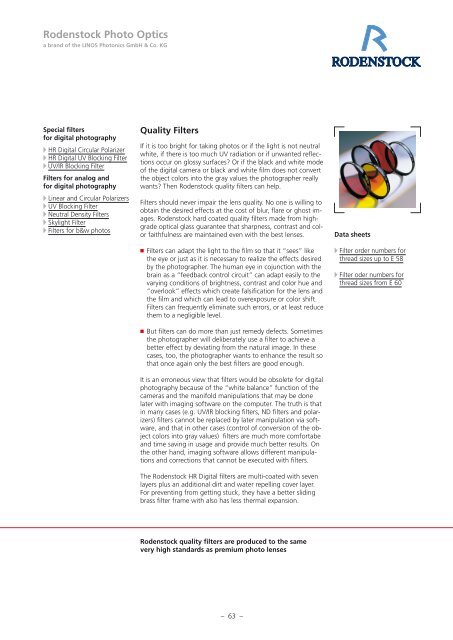
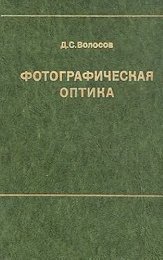
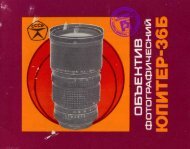
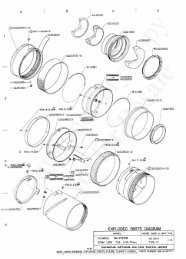
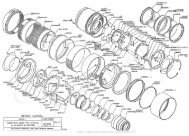

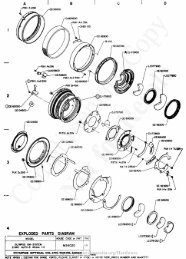
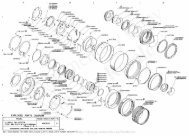
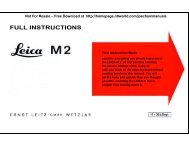
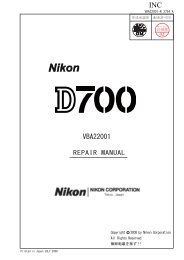
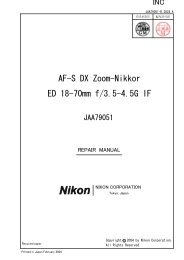
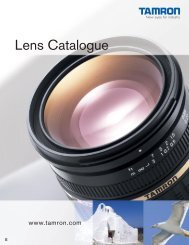

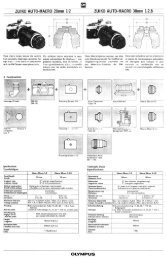

![AF 200 - 400 mm F/5.6 LD [IF] (Model 175D) - Tamron](https://img.yumpu.com/18616610/1/190x245/af-200-400-mm-f-56-ld-if-model-175d-tamron.jpg?quality=85)